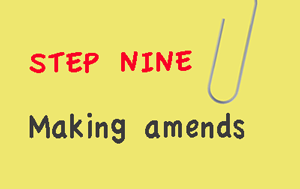
As our food addiction progressed and affected every phase of our lives, lots of times we did things that broke our own rules. We lied, cheated and stole in order to get and hide our food supply. We walked around “drunk on sugar” and relationships were shattered, friendships lost, and we left behind a trail of dismay.
We are given the opportunity in our Twelve Step process to “make things right”.
In Step Eight we made a list of all persons we had harmed, and became willing to make amends to them all. Then, in Step Nine, we made direct amends to such people wherever possible, except when to do so would injure them or others
Implementing these steps is a process that requires help from our sponsors and others in our helping network. Our support people help us overcome fear and develop strategies for our approach to those we have harmed. We start with the understanding that amends are not the same as making apologies. I used to work in the insurance field and one of the aspects of insurance is to “put the insured in the same or similar position as before the loss occurred.” So too in doing our Step Nine, we restore that which we have damaged or broken to the best of our ability. For instance, we don’t apologize saying, “I am sorry I smashed your hundred dollar vase”, instead we make amends and replace the vase. When restoring our relationships, we ask, “How can I make things right?”
We are cautioned in Step Nine to hold back when our amends would injure others. We cannot salve our own conscience by burdening another with our confessions. The obvious truth here is that we don’t talk about affairs that would hurt our spouse if he/she were to know about them. This is a specific situation, where we change our behavior and make amends by being the best person we know how to be in our relationships.
There are times when we can’t make direct amends at all if we cannot locate the person, or they have passed on, or there may be someone who rejects us so completely that we cannot speak to them directly. In each case, we find a way to make amends through prayer, letter writing, and willingness to do the right thing “wherever possible”.
We make “living” amends by growing and changing. Our spiritual way of life gives us direction as to what we need to do on a daily basis. We keep from accumulating new wrongs. And when we are wrong, we can promptly admit it. In our recovery lives, we evaluate and correct each day through the use of our tenth step. We clean up our side of the street in steps eight and nine, and keep our street clean with step ten. In doing this, we become free!